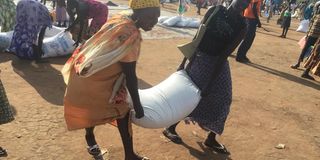WFP agrees to buy food from Uganda

Refugees pick up relief food at Ayilo I Refugee Settlement Camp in Adjumani District last year. PHOTO /MARTIN OKUDI
What you need to know:
The UN agency asked farmers and traders to observe quality and promised to provide technical support.
The World Food Programme (WFP) has agreed to buy relief food from Ugandan farmers but warned that the produce must meet their standards.
Addressing government officials yesterday at a conference organised by the Office of the President in Kampala to discuss how to make Uganda’s maize competitive in the region, the WFP country director, Mr El Khidir Daloum, said they have laid down a clear plan to buy food locally.
“We have made affirmative action to buy (relief food directly) from Uganda for national and regional intervention of WFP. We already started purchasing maize for school feeding programme in Karamoja from local farmers such as a group of female farmers in Kaabong District,” Mr Daloum said.
“But they (farmers and traders) need to observe quality. We are open to provide technical support and train people on post-harvest handling,” he said, adding that they have also worked with government to establish storage facilities in farming communities.
This commitment comes a day after the Minister for Relief, Disaster Preparedness and Refugees, Mr Hilary Onek, warned that the government would expel refugees if the World Food Programme doesn’t buy food to feed refugees from the country’s farmers.
Commenting on Mr Daloum’s remarks, Ms Molly Kamukama, the Minister of State in-charge of Economic Monitoring in the Office of the President, said observing the quality of farm produce will open the country to more markets.
“If we fulfil the standards, we don’t need to fight with WFP. We can even sell to other people, but I know they will buy (from us),” Ms Kamukama said. The amount of food that WFP procures annually is not yet clear.
However, Lt Gen Charles Angina, the deputy coordinator of Operation Wealth Creation (OWC), asked the Uganda National Bureau of Standards and WFP to relax quality requirements for maize that will be consumed in the country.
“In other countries like the United States of America, the acceptable limit of aflatoxins [in a food product] is 20 parts per billion (ppb), but here [in Uganda] we are putting it at 10ppb. The 10 ppb was set for exports, but we should allow products ranging from 10-20ppb,” he said.
Lt Gen Angina added that the high standards are affecting the maize dealers who are seeking certification for their products because they are struggling to meet.
But the State Minister for Trade, Mr Michael Werikhe, said Cabinet has approved the limits and should be observed and enforced for the benefit of local consumers as well as foreigners who purchase from the country.
Lt Gen Angina asked government to purchase and provide to different regions, automatic machines for sorting contaminated grains but he said the machine costs about $3m (Shs10.7b).
“We need [grain] cleaners and dryers in the stores that government is establishing in different parts of the country,” he said. Mr Paul Mwambu, the commissioner for crop inspection and certification at the Agriculture ministry, said aflatoxins develop in grains when not properly dried .
The director of National Agriculture Advisory Services, Dr Samuel Mugasi, said the country should eliminate casual buyers of maize.
He said most maize grains develop aflatoxins while in storage because of poor state of stores owned by buyers who lack knowledge on how to handle maize.
Parish model programme
“The country produces 5 million metric tonnes of maize annually but it only has capacity to [properly] store 1 million metric tonnes of the grains,” he said.
Mr Mwambu said they are working with foreign company Alvian Blanc to construct storage facilities in sub-counties across the country.
The Permanent Secretary at the Office of the President, Mr Yunus Kakande, said the strategies to address the maize challenges and poverty among farmers are in the parish model programme that government intends to roll out. The model, however, attracted resistance from MPs last week, questioning the Shs490b that government requested for the programme.
The model seeks to improve infrastructure, access to quality commodity and credit and provision of social services.




